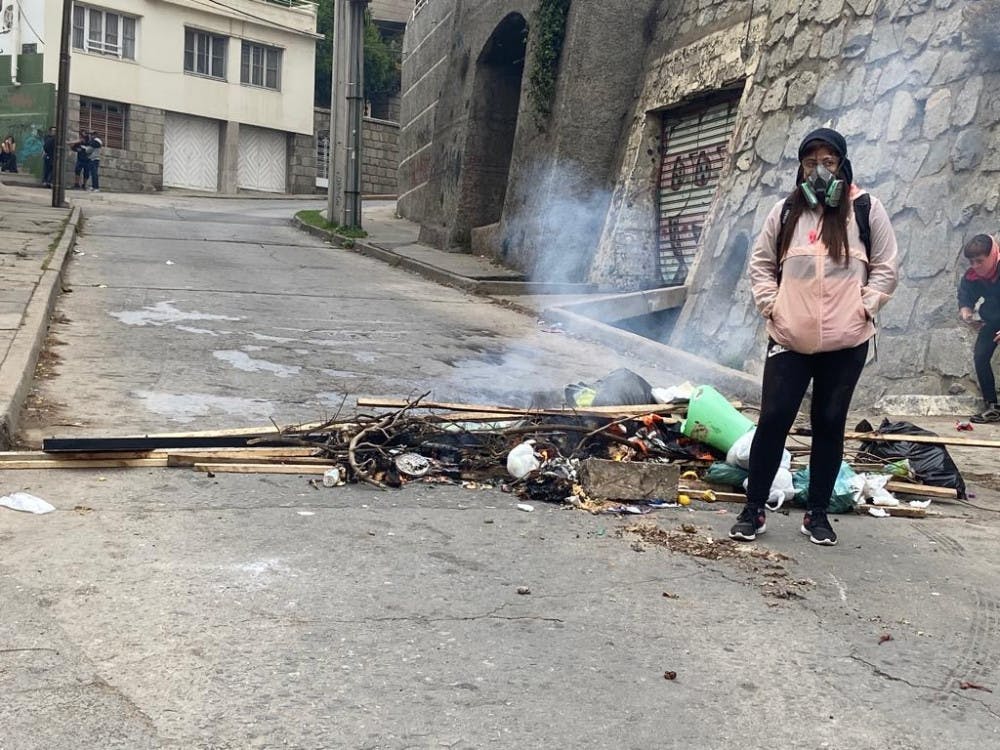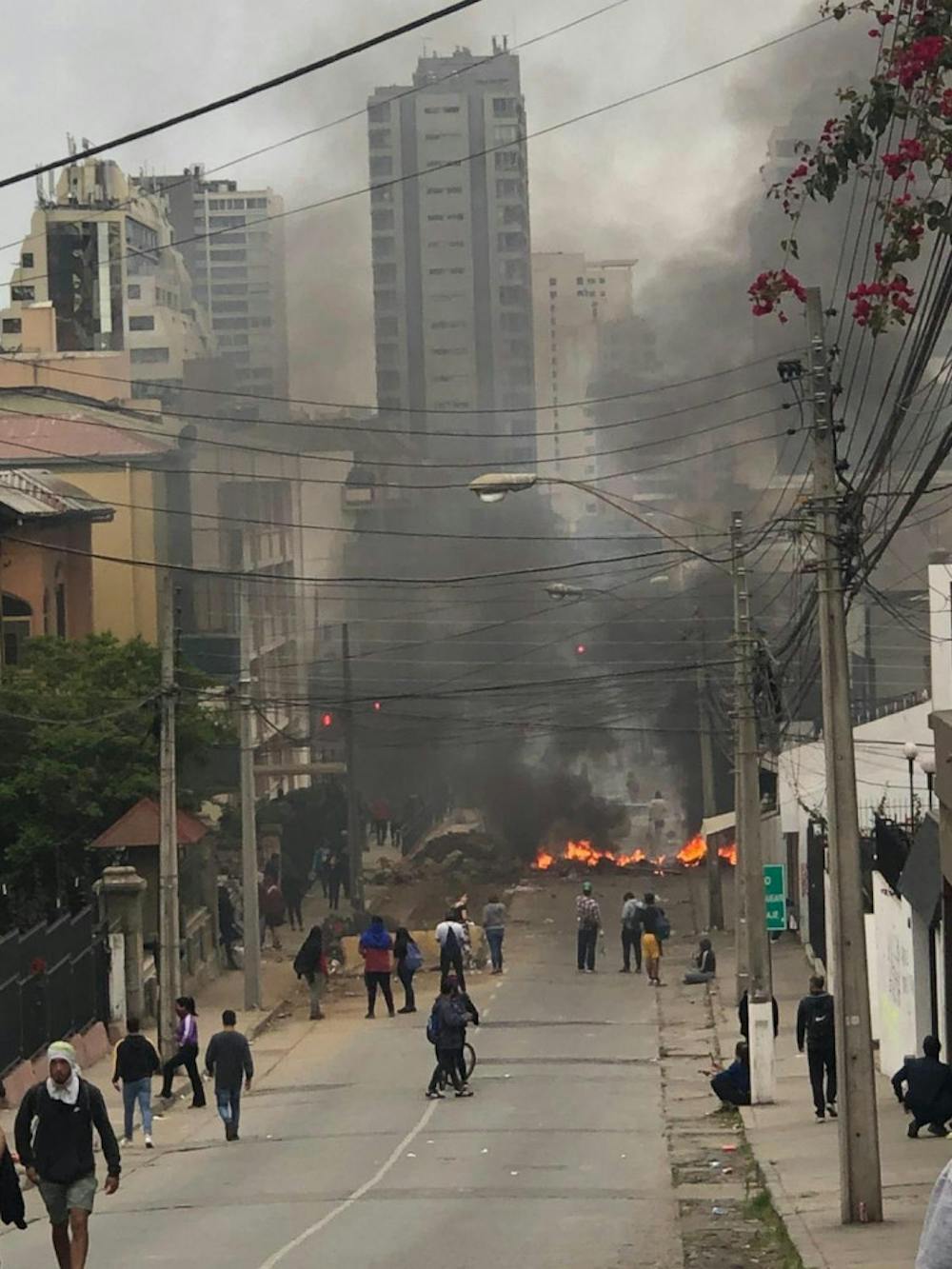Most students studying abroad in Chile chose to stay in the country despite civil unrest, after the college’s study abroad office gave them the option to leave.
After protests started three weeks ago, the study abroad office first considered an evacuation of all students enrolled in Middlebury programs in Chile. On Oct. 24, it elected instead to give them several options. They could remain in Chile, relocate to Buenos Aires, Argentina or return to the United States, where they could earn partial academic credit through remote work or full credit by adding a summer language course. Students were asked to decide on a course of action by Monday, Nov. 4.
Of the 23 students enrolled in Middlebury programs in six Chilean cities, three chose to return to the United States, one chose to relocate to Buenos Aires and the remaining 19 chose to stay in Chile, according to Assistant Director of International Programs Alessandra Capossela.
Students were first asked to decide on one of the four options by Nov. 1. However, many became frustrated by what they saw as limitations in the options. To earn full credit if they went home, students would have had to complete Chilean coursework remotely, in addition to the additional course of summer language school, the cost of which would have been covered by the college. Relocating to Buenos Aires would have allowed students to earn a maximum of 3.5 credits, rather than the full four.

A protestor, protected with a gas mask, stands by burning debris at one of the many demonstrations in the past few days in Viña del Mar.
For many students, the easiest way to earn full credit would be to remain in Chile, where credit wasn’t a guarantee either because many universities there remain closed. In response, students called and sent emails to the study abroad office requesting more flexible ways to earn credit. Capossela responded by sending students revised options in an email on Oct. 29, which included opportunities to earn more credits in Argentina and at home without taking a language school course.
“We are hearing from some of you that you are feeling like you are forced to remain in Chile because you need to get four credits for this semester,” Capossela wrote in that email. “As I had mentioned in a previous message, it certainly was not our intention to preference staying in Chile over any of the other options.”
Capossela followed up with another email to students later that day, detailing courses organized by the study abroad office, independent of Chilean universities, that students remaining in Chile would be able to take while host universities remained closed. The five-week long intensive course focuses on social movements in Latin America and is centered on Chile.
[pullquote speaker="Mason Arndt '21" photo="" align="left" background="on" border="all" shadow="on"]
A lot of the violence has continued. We’re limited in our movements and things feel really off.[/pullquote]
“This was big for us because it means we aren’t relying on the universities to resume classes in order to get credit, something we thought was unlikely to happen,” Mason Arndt ’21 said. Arndt is living in Viña Del Mar and chose to remain there for the semester.
Along with the intensive course, students will earn half a credit for each university class they were taking (most took three or four), one letter-grade credit for internships or independent studies and one credit for a writing and culture class that was already part of the Middlebury program. With these options, students have the opportunity to earn the four credits they expected to receive at the start of the semester.
Sidra Pierson ’21 was one of 11 students living in the sister cities of Viña Del Mar and Valparaíso who signed a petition asking to remain in Chile when the study abroad office considered an evacuation in October. The guarantees of credit for remaining in Chile only made her more sure of her decision, she said.

This sculpture in downtown Viña Del Mar was destroyed after protestors defaced its surface with "Las Vidas No Volver" ("Lives Don't Come Back").
“There was a lot I could still get out of the semester even though we’re giving up a lot of your typical study abroad experiences,” Pierson said. “Getting another month and a half at the time with my Chilean host family and friends, and speaking Spanish, it all felt worth it.”
In Santiago, Mireille Becerra ’21 agreed, saying that staying in Chile is “easiest for me compared to all other options.” Because her semester in Chile is scheduled to end on Nov. 20, she said, leaving the country made little sense.
Though Chilean president Sebastian Piñera lifted the national state of emergency on Oct. 28, protests and violent government response have continued. Students studying in the sister cities and Santiago have watched protests and police crackdowns in their neighborhoods in the past days.
“Marches with thousands of people take place both on the streets and in plazas, parks, or other commercial sectors,” Becerra wrote in an email to The Campus. “Various stores continue to be broken into or set on fire as well. Both to disperse the massive crowds and to stop the robbers, the police use tear gas and water pressure.”
In Viña Del Mar, Arndt said, protests did not ease much even after the state of emergency was lifted. On Nov. 12, Pierson watched smoke rise above the city as fires set by arsonists raged, and took video of police clashing with protesters several blocks from her homestay.
“A lot of the violence has continued,” Arndt said. “We’re limited in our movements and things feel really off. There might be an image of everything going back to normal for students who have stayed, but that’s not really the case.”
On Nov. 13, administrators in Valparaíso had to cancel a meeting of the intensive course for the second time in two weeks amid concerns about students moving between the sister cities
“We’re all feeling like, ‘how the heck are we going to get this course done in the next four weeks?’,” Pierson said.
Students scheduled to study in Chile in the spring said they have received mixed messages about whether they will be able to proceed with their semesters abroad as planned.
“I feel that things are really up in the air, and the abroad offices are not offering very clear or specific information,” said Ella Houlihan ’21, who was planning on studying in Valparaíso in the spring. Some students have filled out applications to study in other locations such as Uruguay, Argentina or Cuba.
“I opened up a second app to Buenos Aires and I’m even considering applying to an external program to Cuba last minute,” said Olivia O’Brien ’21. “I really hope to go to Santiago, though. If Middlebury runs the program in the spring, it is still my top choice.”
According to Capossela, the study abroad office is in conversations with Chile program director Juan Pastene as to options going forward for students scheduled to spend the spring semester there.
“We are planning to let Spring 2020 students know what their options will be by the beginning of December,” she wrote in an email to The Campus.
Most students choose to remain in Chile despite continued civil unrest

SIDRA PIERSON/COURTESY PHOTO
Sidra Pierson ’21, who chose to remain in Chile for the remainder of the semester, said she watched smoke rise above the city as fires set by arsonists raged.
Sidra Pierson ’21, who chose to remain in Chile for the remainder of the semester, said she watched smoke rise above the city as fires set by arsonists raged.
MIRA MICHELS-GUALTIERI/COURTESY PHOTO
MASON ARNDT/THE MIDDLEBURY CAMPUS
Comments



